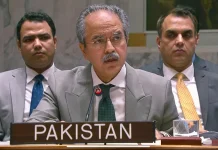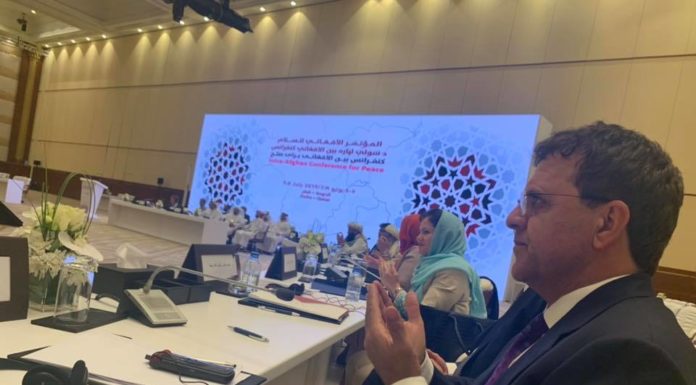Ashrafuddin Pirzada
PESHAWAR(Pakistan): A large number of youngsters including brothers and sisters along with their parents from various parts of Pakistan put their lives at risk to find a better life and face different kinds of abuses including sexual assaults before they reach Europe, the Gulf, Canada, and the United States, said, officials.
Participants unanimously stressed that stricter implementation of existing laws and the creation of employment and business opportunities within the country could help prevent parents from sending their children—particularly teenage girls—abroad in search of a better life, often at great personal risk.
Parents, especially those from low-income families, admitted that sending children abroad is often seen as the only way out of poverty. However, many acknowledged the grave dangers involved. Border authorities reported numerous cases where children—especially girls—faced sexual assault and physical abuse during their long and perilous journeys to Europe.
Smuggling Rings Operating at Pak-Afghan Border
Amir Ahmad, a former border official at the Pak-Afghan crossing, revealed that several agents had been arrested while allegedly attempting to traffic children as young as 10 to 15 years old to Europe through Afghanistan, Iran, and Central Asian countries. He recalled a disturbing case where a man was caught with a 16-year-old girl who had been bought as a “wife” from Chitral, and was being taken to the Gulf to be sold.
“This was not an isolated case,” Ahmad said. “Over the years, we have intercepted dozens of girls, women, and widows from Pakistan being smuggled to work in bars and dance clubs across Europe.”
He further revealed that the Pak-Afghan route has frequently been used to smuggle girls from countries like China, Bangladesh, and Thailand. In 2015-16 alone, authorities foiled at least 79 smuggling attempts involving boys and girls.
The Story of Shomaila Bibi
One of the most heart-wrenching testimonies came from 20-year-old Shomaila Bibi (name changed), who is currently at a rehabilitation centre in Peshawar. She shared that her parents forced her into a so-called marriage with a 44-year-old man named Gul Agha.
“I was told we were going to Iran via Afghanistan, and from there to Turkey and then Europe,” she said. During the three-day journey across the Pakistan-Afghanistan border, she was sexually exploited by multiple traffickers. In Iran, after three months of captivity and abuse, she became pregnant and was abandoned to the Iranian police when she fell ill. Eventually, she was deported back to Pakistan.
“I lost my virginity, my life, everything,” Shomaila said tearfully. “I gave birth to a baby girl in the rehabilitation centre. No one will accept me now.”
Organized Networks and Parental Complicity
Social worker Aseel Khan, who has worked with multiple victims at rehabilitation centres, said organized human smuggling networks are active in Pakistan and Afghanistan, exploiting the desperation of impoverished families.
“In some cases, parents knowingly send their children abroad. In others, they’re paid off. Many families also say they send children to Europe, fearing they might be forcibly recruited by militants,” Khan explained.
He added that several Pakistani citizens die each year trying to cross snow-covered mountain routes to reach Europe, with many others being shot by border forces in Iran or European countries.
According to border police data, 67 human smuggling attempts have been foiled along the Afghan border since January 2018. An official, speaking on condition of anonymity, claimed that 90 percent of the girls rescued were being used for sexual exploitation in various countries. Since underage girls cannot legally apply for travel documents, traffickers often use forged papers and unofficial routes.
Inadequate Rehabilitation Facilities
Authorities admitted that proper rehabilitation facilities do not exist in the tribal districts. Rescued children are often kept temporarily in small compounds before being transferred to centres in Peshawar.
The Case of Nosheen Bibi
Nosheen Bibi, 19, shared that she was sold by her stepmother during a trip to a shopping mall in Mardan. She was taken to Swat and handed over to a man who planned to traffic her to the Gulf.
“I escaped from his house the next day and went straight to the police in Mingora,” she said. “I lived in a rehabilitation centre for a year. Now I work with an NGO that advocates for women’s rights.”
Alarming Numbers, Silent Tragedies
Amir Takkar, an activist with a non-profit organization working with runaway and drug-addicted children, estimated that nearly 300 children—both boys and girls—are trafficked internally for forced marriages and child labour every year. He said that between 2017 and 2020, at least 275 children (197 boys and 78 girls) were reported missing across Pakistan, with their whereabouts still unknown.
He blamed the crisis on parental ignorance, weak law enforcement, and deep-rooted patriarchal customs.
Police Investigations Reveal Complicity
Sameen Aslam, a police officer in Peshawar, confirmed receiving around 50 complaints of missing children in the past two months alone. Investigations revealed that many had crossed the border illegally.
“In several cases, parents colluded with smugglers to send their children abroad through relatives, but they ended up being exploited,” he said. He recently arrested four individuals attempting to traffic two young girls from Sindh into Afghanistan.
He further noted that families from regions like Chitral, Punjab, Sindh, and Swat often sell girls to older men who then take them to Gulf states under the guise of marriage.
“These families often pretend not to know where their children have gone, to avoid scrutiny,” Aslam added.
Call to Action
After the session, participants agreed to launch awareness campaigns and exert pressure on the authorities to crack down on traffickers. They also urged the government to create opportunities at home so that young people are not forced to gamble with their futures and their dignity abroad.











